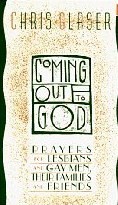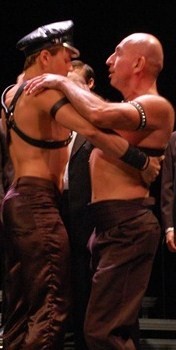The Intimate Dance of Sexuality and Spirituality
Posted On Wednesday, 2 September 2009 at at 14:29 by TerenceI would expect that most of my lesbian & gay readers have known the liberating growth experience of coming out: at least to themselves and to close friends, or (where realistically appropriate), to family and colleagues. But how many, I wonder, have found the even greater joy of coming out to God? I mean here not just superficially, but fully and frankly, taking your sexuality deep into your prayer life, giving thanks for the joys and satisfactions, even the exhilaration of orgasm; sharing the pain of the frustrations and disappointments; even building the Lord into your sexual fantasies, or turning your fantasies into prayer?
This appears to be heretical, sacrilegious, but is not. It is an old idea, going back at least to the Song of Songs, and to the great mystics: St John of the Cross, St Theresa of Avila and Julian of Norwich. Modern writers who have discussed this idea from a gay perspective include Daniel Helminiak, Michael B Kelly and John McNeill. (Jim Cotter and Jack Dominian are just two I know of who have done so from a more traditional heterosexual perspective).
Now I have come across another who has done so directly – Chris Glaser, who has put together a prayer collection under the title “Coming Out to God.”


I first heard of this book when it was recommended to the congregation by the celebrant during Sunday Mass - so it has the warm approval of at least one Catholic priest in good standing. Looking into it, I was particularly impressed by the powerful and moving writing of the introduction.
Glaser shares with us his own early struggle, torn between his innate sexuality and spirituality, which he believed, like most Christians, to be in some kind of conflict. Using a striking metaphor, picturing each of these two as strangers wary of each other at a dance, he tells how they first put out tentative feelers, then began cautiously to dance, each struggling for dominance and attempting to lead – before finding true partnership, and allowing the dance to lead them:

"When my sexuality began to emerge, my spirituality froze in fear, then nearly ran out of the room. But then it noticed other souls dancing gracefully, and realised it was missing their grace. My spirituality wondered if the lack of grace had something to do with rejection of the stranger on the other side of the room, my sexuality.
Timidly, one invited the other to dance. At first, they scarcely looked at each other… they were lousy dancers. Then they cast furtive glances at each other, sometimes angry or resentful, sometimes flirtatious and seductive….Finally they found times when the dance led them, and for brief moments they became perfect dancers, full of grace, true to each other. They danced together as my soul."
He also draws an important parallel between sexuality and spirituality, stating that they are both routes to intimacy in relationships: sexuality builds intimacy in human relationships, spirituality does in our relationship with the Lord. This equivalence thus makes them natural partners.
"Sexuality and spirituality are not opposing forces, as is frequently supposed today. Instead, both draw people into relationship. Sexuality draws us into physical relationships: touching, hugging…… kissing and intercourse. Spirituality draws us into relationships that both incl ude and transcend bodies because it includes and transcends that which is visible……Both our sexual and spiritual powers are holy, and therefore both my be profaned. At their holiest, these powers lead to love in all its many expressions. At their most profane, they may lead to apathy or hate. The integrity of both sexual and spiritual powers is called the soul."
The final observation that struck an enormous personal chord with me, was his statement that when we come out to God, we allow God to come out to us: to enter more fully into our own lives, which is the best defence we can develop against the homophobic bigotry that masquerades freely under the name of religion:
"In prayer, coming out to God as sexual-spiritual beings opens us up, I believe, to God coming out to us in the dance of Substance and Sensuality, spirituality and sexuality. Prayer becomes a place wherein the choreography of the dance of spirituality and sexuality gets worked out. When we allow the Lord of the Dance to lead, sexuality becomes responsible and spirituality becomes responsive."
For more details, and extracts from the introduction, see "Coming out to God".
See also:
At The Wild Reed: